Mathematics in the Early Childhood Curriculum: A Comprehensive Report
VerifiedAdded on 2022/08/18
|15
|2682
|11
Report
AI Summary
This report, titled "Mathematics in the Early Childhood Curriculum," delves into the critical role of mathematics in early childhood education. It emphasizes the importance of mathematics in developing essential skills like reasoning, problem-solving, and critical thinking. The report explores various teaching methods and approaches, highlighting the need to adapt strategies based on the student's attentiveness, understanding, and learning pace. It provides detailed lesson planning guidelines tailored to different age groups, from birth to 5 years, and primary school levels, outlining expected cognitive and mathematical development, relevant concepts, learning outcomes, appropriate learning experiences, and teaching pedagogies. Furthermore, it discusses assessment methods to track student progress. This report provides valuable insights into how educators can effectively integrate mathematics into early childhood curricula and promote a positive learning environment.
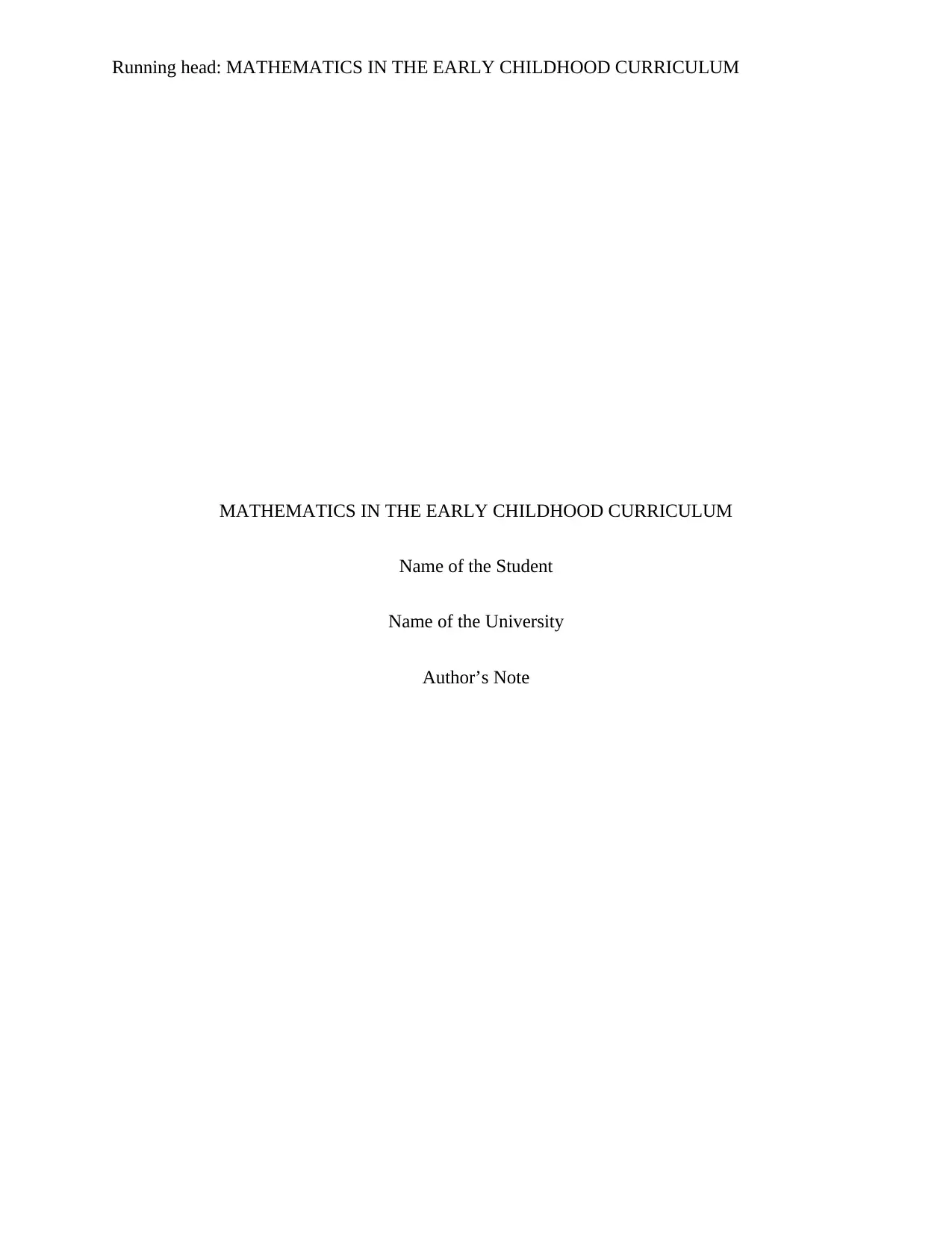
Running head: MATHEMATICS IN THE EARLY CHILDHOOD CURRICULUM
MATHEMATICS IN THE EARLY CHILDHOOD CURRICULUM
Name of the Student
Name of the University
Author’s Note
MATHEMATICS IN THE EARLY CHILDHOOD CURRICULUM
Name of the Student
Name of the University
Author’s Note
Paraphrase This Document
Need a fresh take? Get an instant paraphrase of this document with our AI Paraphraser
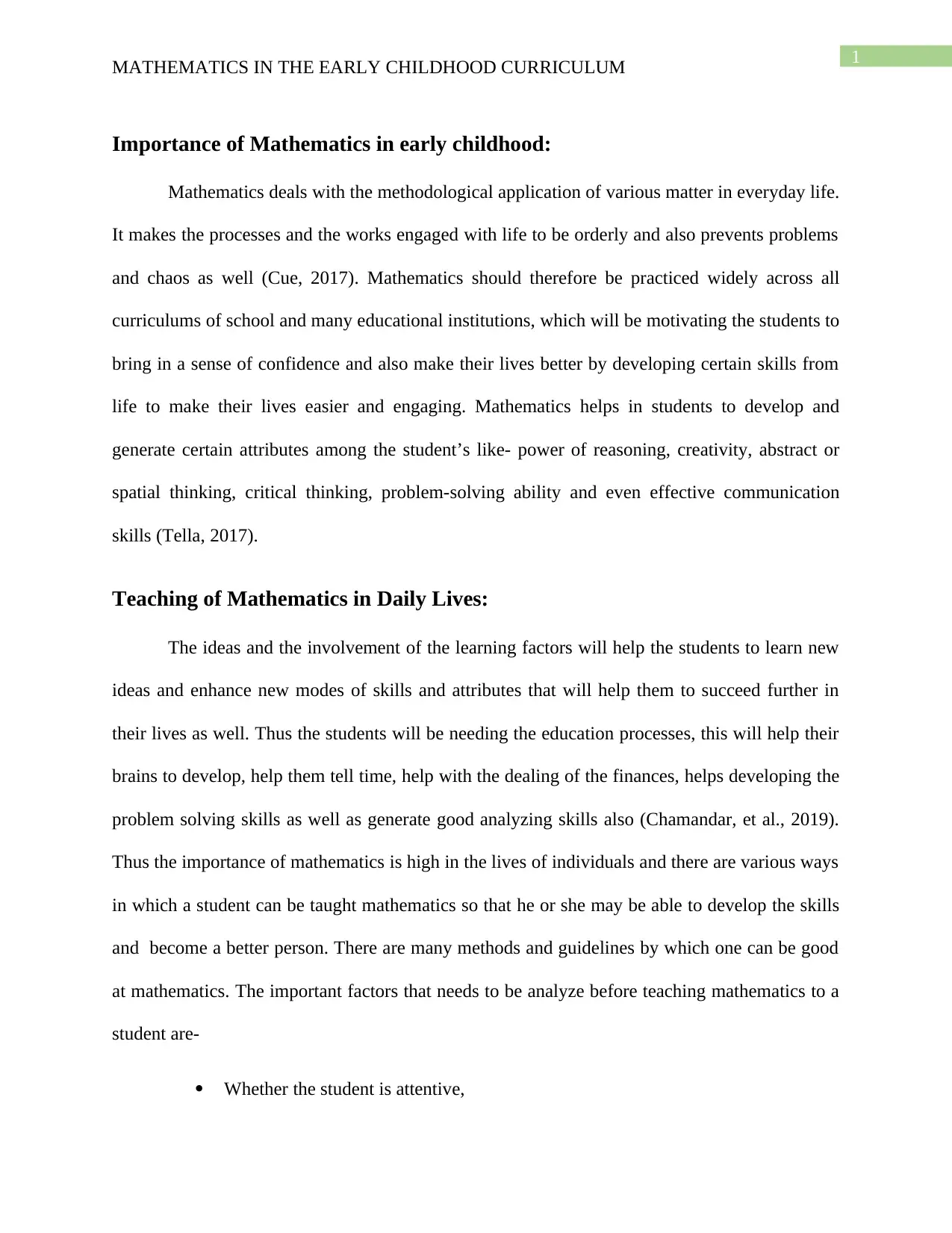
1
MATHEMATICS IN THE EARLY CHILDHOOD CURRICULUM
Importance of Mathematics in early childhood:
Mathematics deals with the methodological application of various matter in everyday life.
It makes the processes and the works engaged with life to be orderly and also prevents problems
and chaos as well (Cue, 2017). Mathematics should therefore be practiced widely across all
curriculums of school and many educational institutions, which will be motivating the students to
bring in a sense of confidence and also make their lives better by developing certain skills from
life to make their lives easier and engaging. Mathematics helps in students to develop and
generate certain attributes among the student’s like- power of reasoning, creativity, abstract or
spatial thinking, critical thinking, problem-solving ability and even effective communication
skills (Tella, 2017).
Teaching of Mathematics in Daily Lives:
The ideas and the involvement of the learning factors will help the students to learn new
ideas and enhance new modes of skills and attributes that will help them to succeed further in
their lives as well. Thus the students will be needing the education processes, this will help their
brains to develop, help them tell time, help with the dealing of the finances, helps developing the
problem solving skills as well as generate good analyzing skills also (Chamandar, et al., 2019).
Thus the importance of mathematics is high in the lives of individuals and there are various ways
in which a student can be taught mathematics so that he or she may be able to develop the skills
and become a better person. There are many methods and guidelines by which one can be good
at mathematics. The important factors that needs to be analyze before teaching mathematics to a
student are-
Whether the student is attentive,
MATHEMATICS IN THE EARLY CHILDHOOD CURRICULUM
Importance of Mathematics in early childhood:
Mathematics deals with the methodological application of various matter in everyday life.
It makes the processes and the works engaged with life to be orderly and also prevents problems
and chaos as well (Cue, 2017). Mathematics should therefore be practiced widely across all
curriculums of school and many educational institutions, which will be motivating the students to
bring in a sense of confidence and also make their lives better by developing certain skills from
life to make their lives easier and engaging. Mathematics helps in students to develop and
generate certain attributes among the student’s like- power of reasoning, creativity, abstract or
spatial thinking, critical thinking, problem-solving ability and even effective communication
skills (Tella, 2017).
Teaching of Mathematics in Daily Lives:
The ideas and the involvement of the learning factors will help the students to learn new
ideas and enhance new modes of skills and attributes that will help them to succeed further in
their lives as well. Thus the students will be needing the education processes, this will help their
brains to develop, help them tell time, help with the dealing of the finances, helps developing the
problem solving skills as well as generate good analyzing skills also (Chamandar, et al., 2019).
Thus the importance of mathematics is high in the lives of individuals and there are various ways
in which a student can be taught mathematics so that he or she may be able to develop the skills
and become a better person. There are many methods and guidelines by which one can be good
at mathematics. The important factors that needs to be analyze before teaching mathematics to a
student are-
Whether the student is attentive,
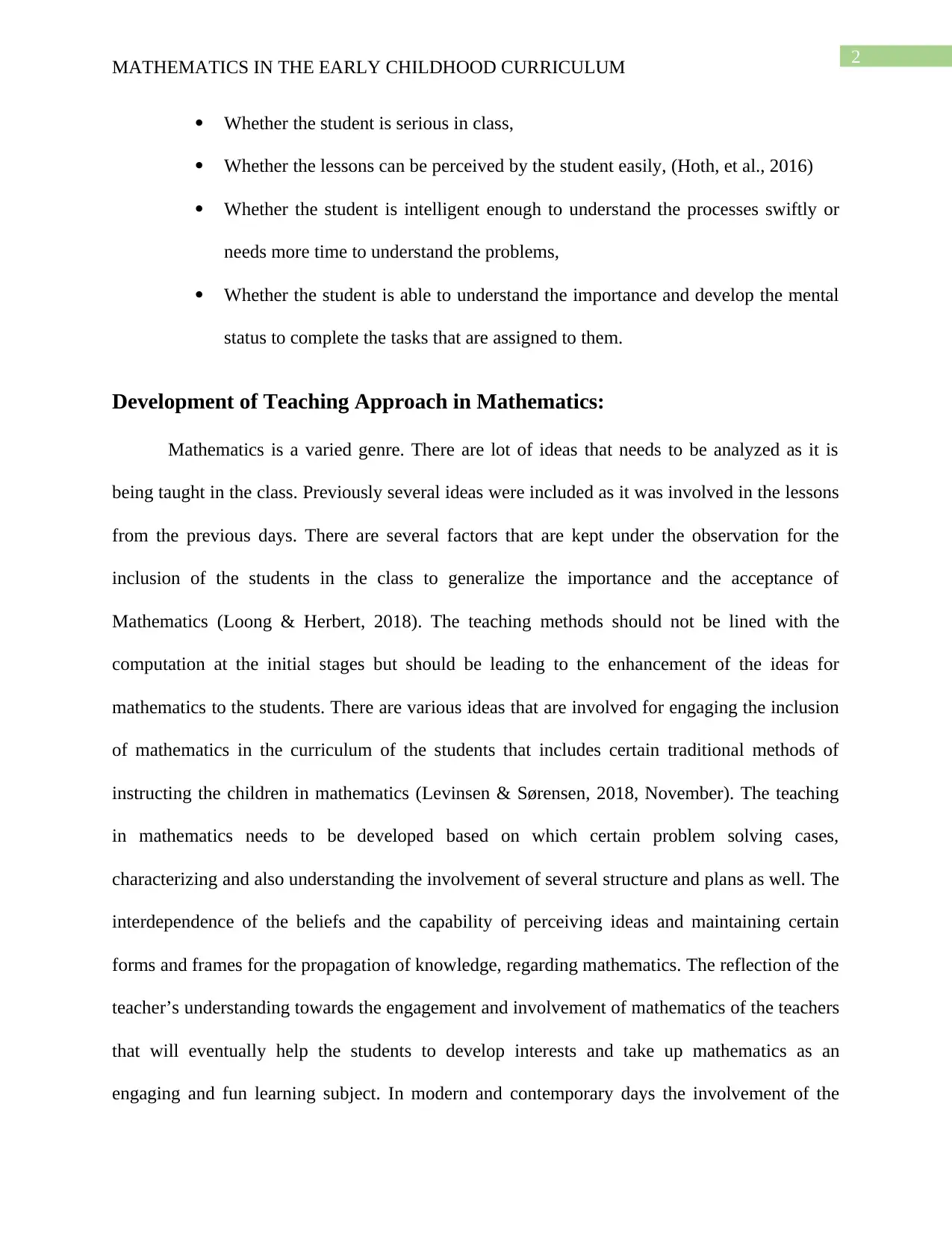
2
MATHEMATICS IN THE EARLY CHILDHOOD CURRICULUM
Whether the student is serious in class,
Whether the lessons can be perceived by the student easily, (Hoth, et al., 2016)
Whether the student is intelligent enough to understand the processes swiftly or
needs more time to understand the problems,
Whether the student is able to understand the importance and develop the mental
status to complete the tasks that are assigned to them.
Development of Teaching Approach in Mathematics:
Mathematics is a varied genre. There are lot of ideas that needs to be analyzed as it is
being taught in the class. Previously several ideas were included as it was involved in the lessons
from the previous days. There are several factors that are kept under the observation for the
inclusion of the students in the class to generalize the importance and the acceptance of
Mathematics (Loong & Herbert, 2018). The teaching methods should not be lined with the
computation at the initial stages but should be leading to the enhancement of the ideas for
mathematics to the students. There are various ideas that are involved for engaging the inclusion
of mathematics in the curriculum of the students that includes certain traditional methods of
instructing the children in mathematics (Levinsen & Sørensen, 2018, November). The teaching
in mathematics needs to be developed based on which certain problem solving cases,
characterizing and also understanding the involvement of several structure and plans as well. The
interdependence of the beliefs and the capability of perceiving ideas and maintaining certain
forms and frames for the propagation of knowledge, regarding mathematics. The reflection of the
teacher’s understanding towards the engagement and involvement of mathematics of the teachers
that will eventually help the students to develop interests and take up mathematics as an
engaging and fun learning subject. In modern and contemporary days the involvement of the
MATHEMATICS IN THE EARLY CHILDHOOD CURRICULUM
Whether the student is serious in class,
Whether the lessons can be perceived by the student easily, (Hoth, et al., 2016)
Whether the student is intelligent enough to understand the processes swiftly or
needs more time to understand the problems,
Whether the student is able to understand the importance and develop the mental
status to complete the tasks that are assigned to them.
Development of Teaching Approach in Mathematics:
Mathematics is a varied genre. There are lot of ideas that needs to be analyzed as it is
being taught in the class. Previously several ideas were included as it was involved in the lessons
from the previous days. There are several factors that are kept under the observation for the
inclusion of the students in the class to generalize the importance and the acceptance of
Mathematics (Loong & Herbert, 2018). The teaching methods should not be lined with the
computation at the initial stages but should be leading to the enhancement of the ideas for
mathematics to the students. There are various ideas that are involved for engaging the inclusion
of mathematics in the curriculum of the students that includes certain traditional methods of
instructing the children in mathematics (Levinsen & Sørensen, 2018, November). The teaching
in mathematics needs to be developed based on which certain problem solving cases,
characterizing and also understanding the involvement of several structure and plans as well. The
interdependence of the beliefs and the capability of perceiving ideas and maintaining certain
forms and frames for the propagation of knowledge, regarding mathematics. The reflection of the
teacher’s understanding towards the engagement and involvement of mathematics of the teachers
that will eventually help the students to develop interests and take up mathematics as an
engaging and fun learning subject. In modern and contemporary days the involvement of the
⊘ This is a preview!⊘
Do you want full access?
Subscribe today to unlock all pages.

Trusted by 1+ million students worldwide
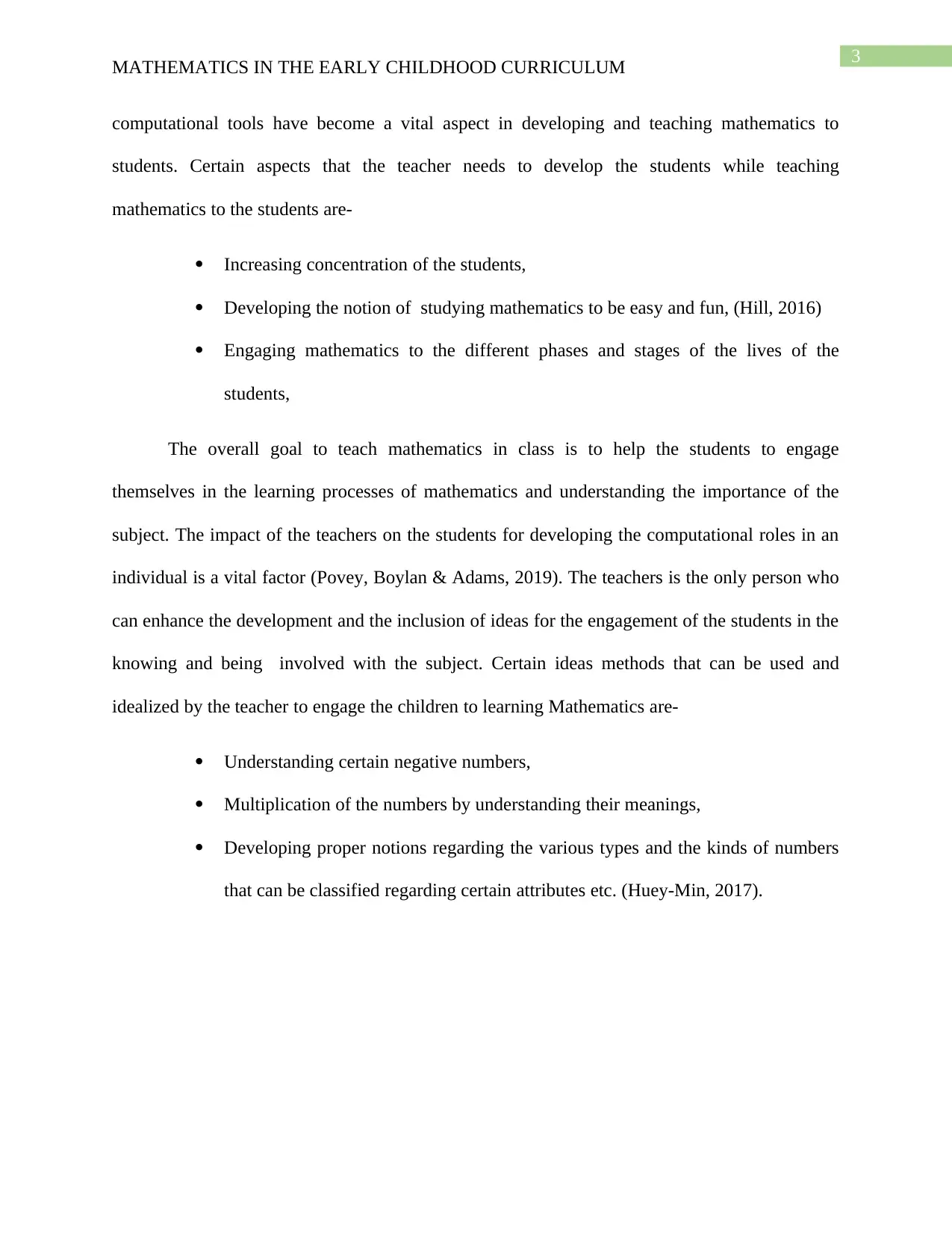
3
MATHEMATICS IN THE EARLY CHILDHOOD CURRICULUM
computational tools have become a vital aspect in developing and teaching mathematics to
students. Certain aspects that the teacher needs to develop the students while teaching
mathematics to the students are-
Increasing concentration of the students,
Developing the notion of studying mathematics to be easy and fun, (Hill, 2016)
Engaging mathematics to the different phases and stages of the lives of the
students,
The overall goal to teach mathematics in class is to help the students to engage
themselves in the learning processes of mathematics and understanding the importance of the
subject. The impact of the teachers on the students for developing the computational roles in an
individual is a vital factor (Povey, Boylan & Adams, 2019). The teachers is the only person who
can enhance the development and the inclusion of ideas for the engagement of the students in the
knowing and being involved with the subject. Certain ideas methods that can be used and
idealized by the teacher to engage the children to learning Mathematics are-
Understanding certain negative numbers,
Multiplication of the numbers by understanding their meanings,
Developing proper notions regarding the various types and the kinds of numbers
that can be classified regarding certain attributes etc. (Huey-Min, 2017).
MATHEMATICS IN THE EARLY CHILDHOOD CURRICULUM
computational tools have become a vital aspect in developing and teaching mathematics to
students. Certain aspects that the teacher needs to develop the students while teaching
mathematics to the students are-
Increasing concentration of the students,
Developing the notion of studying mathematics to be easy and fun, (Hill, 2016)
Engaging mathematics to the different phases and stages of the lives of the
students,
The overall goal to teach mathematics in class is to help the students to engage
themselves in the learning processes of mathematics and understanding the importance of the
subject. The impact of the teachers on the students for developing the computational roles in an
individual is a vital factor (Povey, Boylan & Adams, 2019). The teachers is the only person who
can enhance the development and the inclusion of ideas for the engagement of the students in the
knowing and being involved with the subject. Certain ideas methods that can be used and
idealized by the teacher to engage the children to learning Mathematics are-
Understanding certain negative numbers,
Multiplication of the numbers by understanding their meanings,
Developing proper notions regarding the various types and the kinds of numbers
that can be classified regarding certain attributes etc. (Huey-Min, 2017).
Paraphrase This Document
Need a fresh take? Get an instant paraphrase of this document with our AI Paraphraser
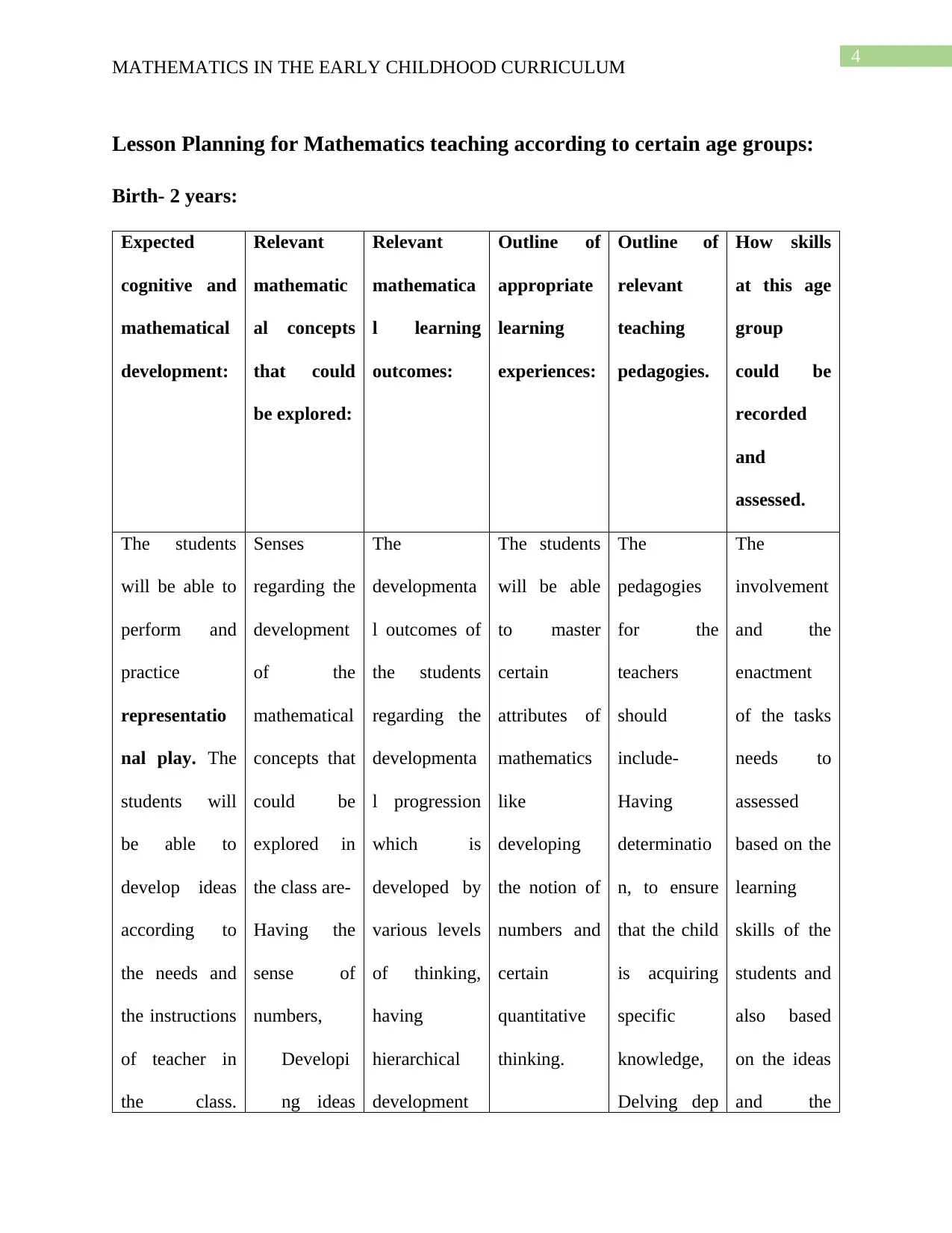
4
MATHEMATICS IN THE EARLY CHILDHOOD CURRICULUM
Lesson Planning for Mathematics teaching according to certain age groups:
Birth- 2 years:
Expected
cognitive and
mathematical
development:
Relevant
mathematic
al concepts
that could
be explored:
Relevant
mathematica
l learning
outcomes:
Outline of
appropriate
learning
experiences:
Outline of
relevant
teaching
pedagogies.
How skills
at this age
group
could be
recorded
and
assessed.
The students
will be able to
perform and
practice
representatio
nal play. The
students will
be able to
develop ideas
according to
the needs and
the instructions
of teacher in
the class.
Senses
regarding the
development
of the
mathematical
concepts that
could be
explored in
the class are-
Having the
sense of
numbers,
Developi
ng ideas
The
developmenta
l outcomes of
the students
regarding the
developmenta
l progression
which is
developed by
various levels
of thinking,
having
hierarchical
development
The students
will be able
to master
certain
attributes of
mathematics
like
developing
the notion of
numbers and
certain
quantitative
thinking.
The
pedagogies
for the
teachers
should
include-
Having
determinatio
n, to ensure
that the child
is acquiring
specific
knowledge,
Delving dep
The
involvement
and the
enactment
of the tasks
needs to
assessed
based on the
learning
skills of the
students and
also based
on the ideas
and the
MATHEMATICS IN THE EARLY CHILDHOOD CURRICULUM
Lesson Planning for Mathematics teaching according to certain age groups:
Birth- 2 years:
Expected
cognitive and
mathematical
development:
Relevant
mathematic
al concepts
that could
be explored:
Relevant
mathematica
l learning
outcomes:
Outline of
appropriate
learning
experiences:
Outline of
relevant
teaching
pedagogies.
How skills
at this age
group
could be
recorded
and
assessed.
The students
will be able to
perform and
practice
representatio
nal play. The
students will
be able to
develop ideas
according to
the needs and
the instructions
of teacher in
the class.
Senses
regarding the
development
of the
mathematical
concepts that
could be
explored in
the class are-
Having the
sense of
numbers,
Developi
ng ideas
The
developmenta
l outcomes of
the students
regarding the
developmenta
l progression
which is
developed by
various levels
of thinking,
having
hierarchical
development
The students
will be able
to master
certain
attributes of
mathematics
like
developing
the notion of
numbers and
certain
quantitative
thinking.
The
pedagogies
for the
teachers
should
include-
Having
determinatio
n, to ensure
that the child
is acquiring
specific
knowledge,
Delving dep
The
involvement
and the
enactment
of the tasks
needs to
assessed
based on the
learning
skills of the
students and
also based
on the ideas
and the
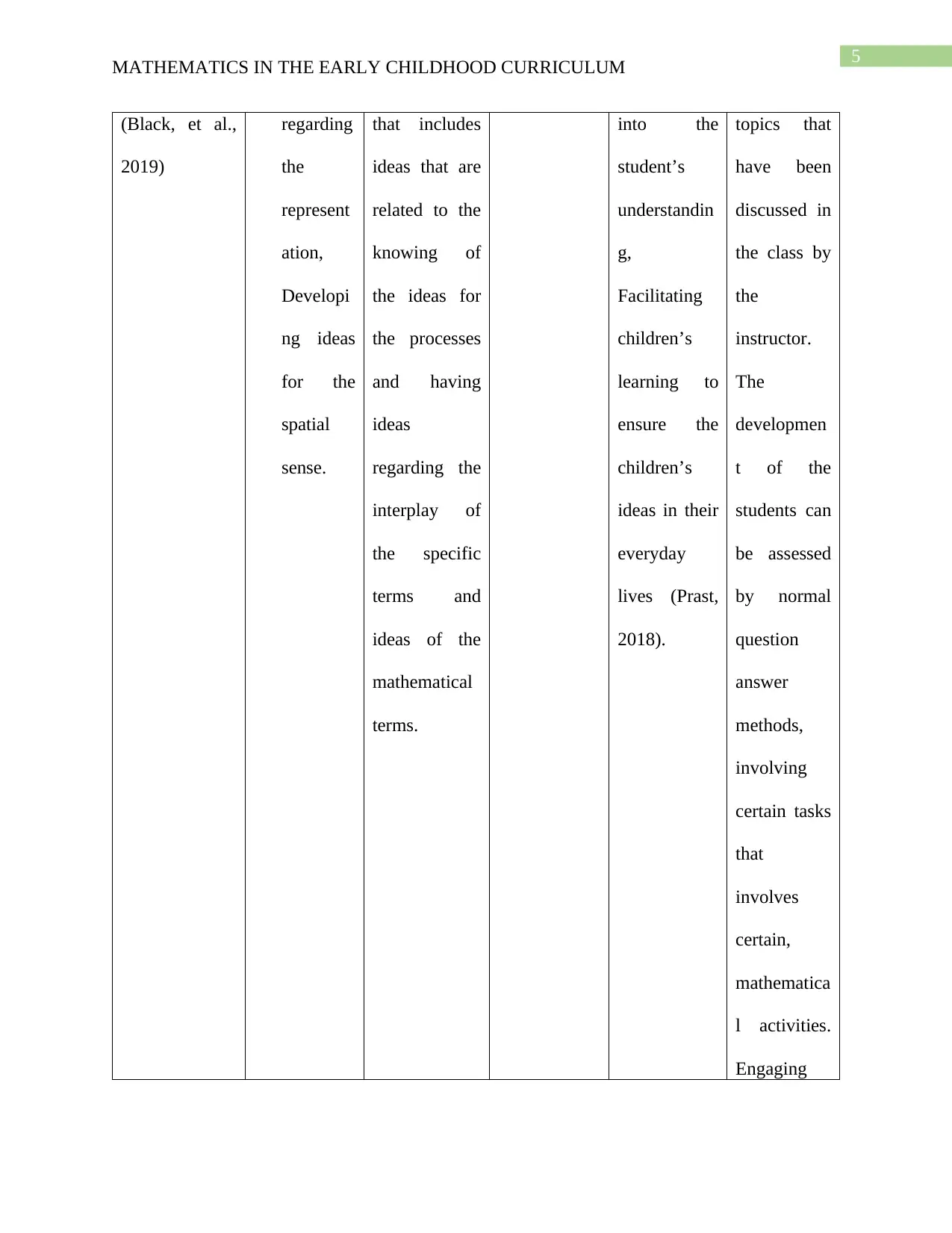
5
MATHEMATICS IN THE EARLY CHILDHOOD CURRICULUM
(Black, et al.,
2019)
regarding
the
represent
ation,
Developi
ng ideas
for the
spatial
sense.
that includes
ideas that are
related to the
knowing of
the ideas for
the processes
and having
ideas
regarding the
interplay of
the specific
terms and
ideas of the
mathematical
terms.
into the
student’s
understandin
g,
Facilitating
children’s
learning to
ensure the
children’s
ideas in their
everyday
lives (Prast,
2018).
topics that
have been
discussed in
the class by
the
instructor.
The
developmen
t of the
students can
be assessed
by normal
question
answer
methods,
involving
certain tasks
that
involves
certain,
mathematica
l activities.
Engaging
MATHEMATICS IN THE EARLY CHILDHOOD CURRICULUM
(Black, et al.,
2019)
regarding
the
represent
ation,
Developi
ng ideas
for the
spatial
sense.
that includes
ideas that are
related to the
knowing of
the ideas for
the processes
and having
ideas
regarding the
interplay of
the specific
terms and
ideas of the
mathematical
terms.
into the
student’s
understandin
g,
Facilitating
children’s
learning to
ensure the
children’s
ideas in their
everyday
lives (Prast,
2018).
topics that
have been
discussed in
the class by
the
instructor.
The
developmen
t of the
students can
be assessed
by normal
question
answer
methods,
involving
certain tasks
that
involves
certain,
mathematica
l activities.
Engaging
⊘ This is a preview!⊘
Do you want full access?
Subscribe today to unlock all pages.

Trusted by 1+ million students worldwide
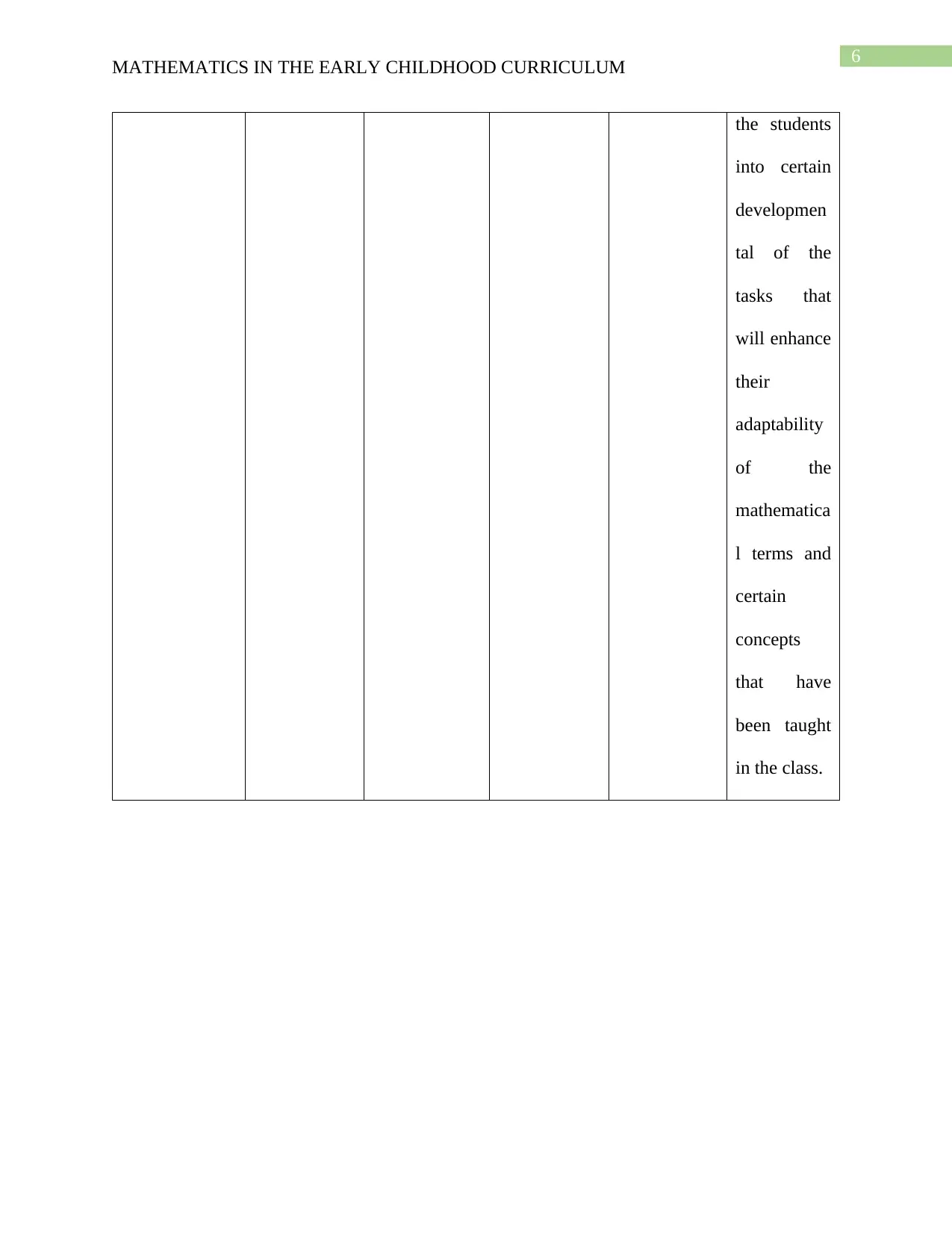
6
MATHEMATICS IN THE EARLY CHILDHOOD CURRICULUM
the students
into certain
developmen
tal of the
tasks that
will enhance
their
adaptability
of the
mathematica
l terms and
certain
concepts
that have
been taught
in the class.
MATHEMATICS IN THE EARLY CHILDHOOD CURRICULUM
the students
into certain
developmen
tal of the
tasks that
will enhance
their
adaptability
of the
mathematica
l terms and
certain
concepts
that have
been taught
in the class.
Paraphrase This Document
Need a fresh take? Get an instant paraphrase of this document with our AI Paraphraser
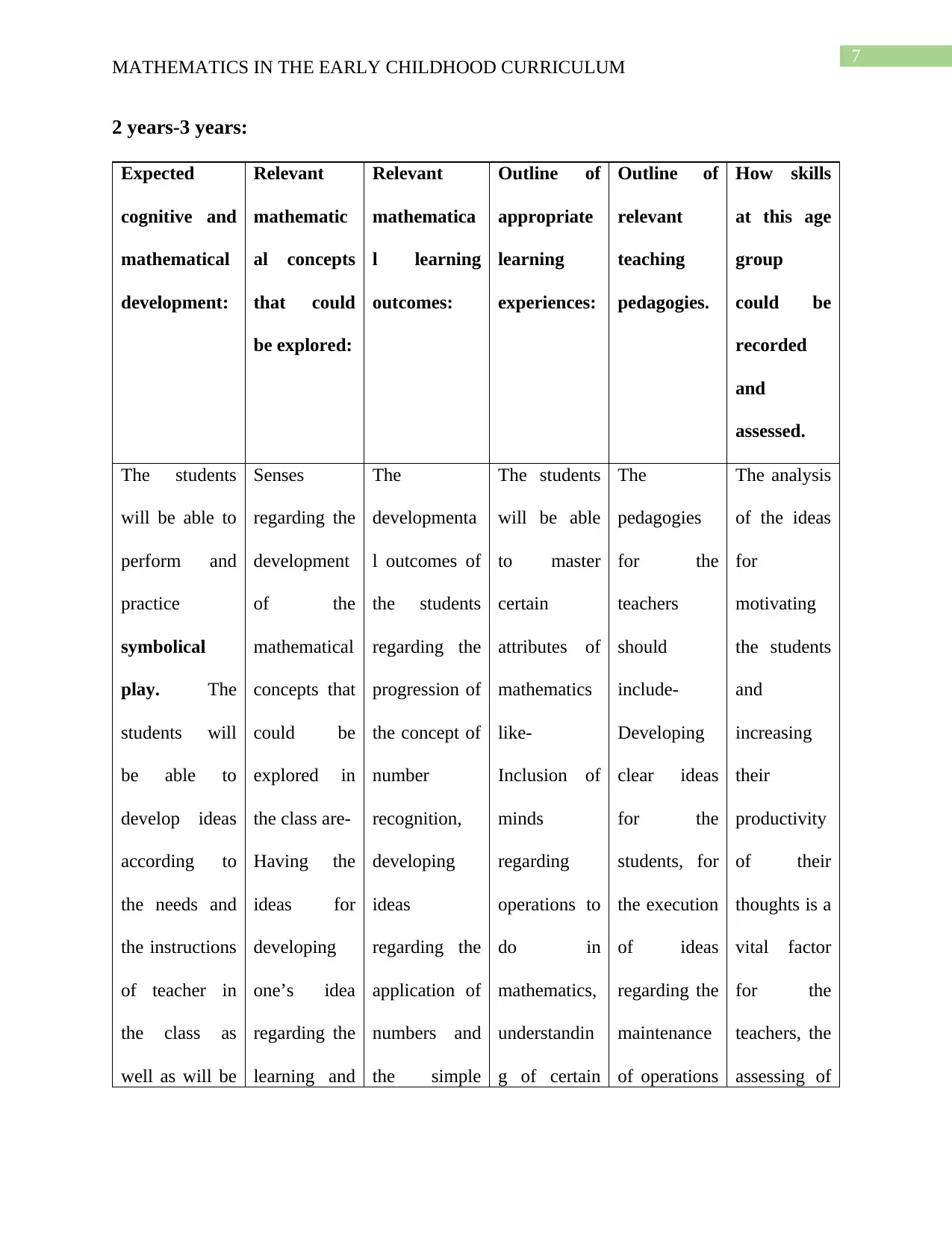
7
MATHEMATICS IN THE EARLY CHILDHOOD CURRICULUM
2 years-3 years:
Expected
cognitive and
mathematical
development:
Relevant
mathematic
al concepts
that could
be explored:
Relevant
mathematica
l learning
outcomes:
Outline of
appropriate
learning
experiences:
Outline of
relevant
teaching
pedagogies.
How skills
at this age
group
could be
recorded
and
assessed.
The students
will be able to
perform and
practice
symbolical
play. The
students will
be able to
develop ideas
according to
the needs and
the instructions
of teacher in
the class as
well as will be
Senses
regarding the
development
of the
mathematical
concepts that
could be
explored in
the class are-
Having the
ideas for
developing
one’s idea
regarding the
learning and
The
developmenta
l outcomes of
the students
regarding the
progression of
the concept of
number
recognition,
developing
ideas
regarding the
application of
numbers and
the simple
The students
will be able
to master
certain
attributes of
mathematics
like-
Inclusion of
minds
regarding
operations to
do in
mathematics,
understandin
g of certain
The
pedagogies
for the
teachers
should
include-
Developing
clear ideas
for the
students, for
the execution
of ideas
regarding the
maintenance
of operations
The analysis
of the ideas
for
motivating
the students
and
increasing
their
productivity
of their
thoughts is a
vital factor
for the
teachers, the
assessing of
MATHEMATICS IN THE EARLY CHILDHOOD CURRICULUM
2 years-3 years:
Expected
cognitive and
mathematical
development:
Relevant
mathematic
al concepts
that could
be explored:
Relevant
mathematica
l learning
outcomes:
Outline of
appropriate
learning
experiences:
Outline of
relevant
teaching
pedagogies.
How skills
at this age
group
could be
recorded
and
assessed.
The students
will be able to
perform and
practice
symbolical
play. The
students will
be able to
develop ideas
according to
the needs and
the instructions
of teacher in
the class as
well as will be
Senses
regarding the
development
of the
mathematical
concepts that
could be
explored in
the class are-
Having the
ideas for
developing
one’s idea
regarding the
learning and
The
developmenta
l outcomes of
the students
regarding the
progression of
the concept of
number
recognition,
developing
ideas
regarding the
application of
numbers and
the simple
The students
will be able
to master
certain
attributes of
mathematics
like-
Inclusion of
minds
regarding
operations to
do in
mathematics,
understandin
g of certain
The
pedagogies
for the
teachers
should
include-
Developing
clear ideas
for the
students, for
the execution
of ideas
regarding the
maintenance
of operations
The analysis
of the ideas
for
motivating
the students
and
increasing
their
productivity
of their
thoughts is a
vital factor
for the
teachers, the
assessing of
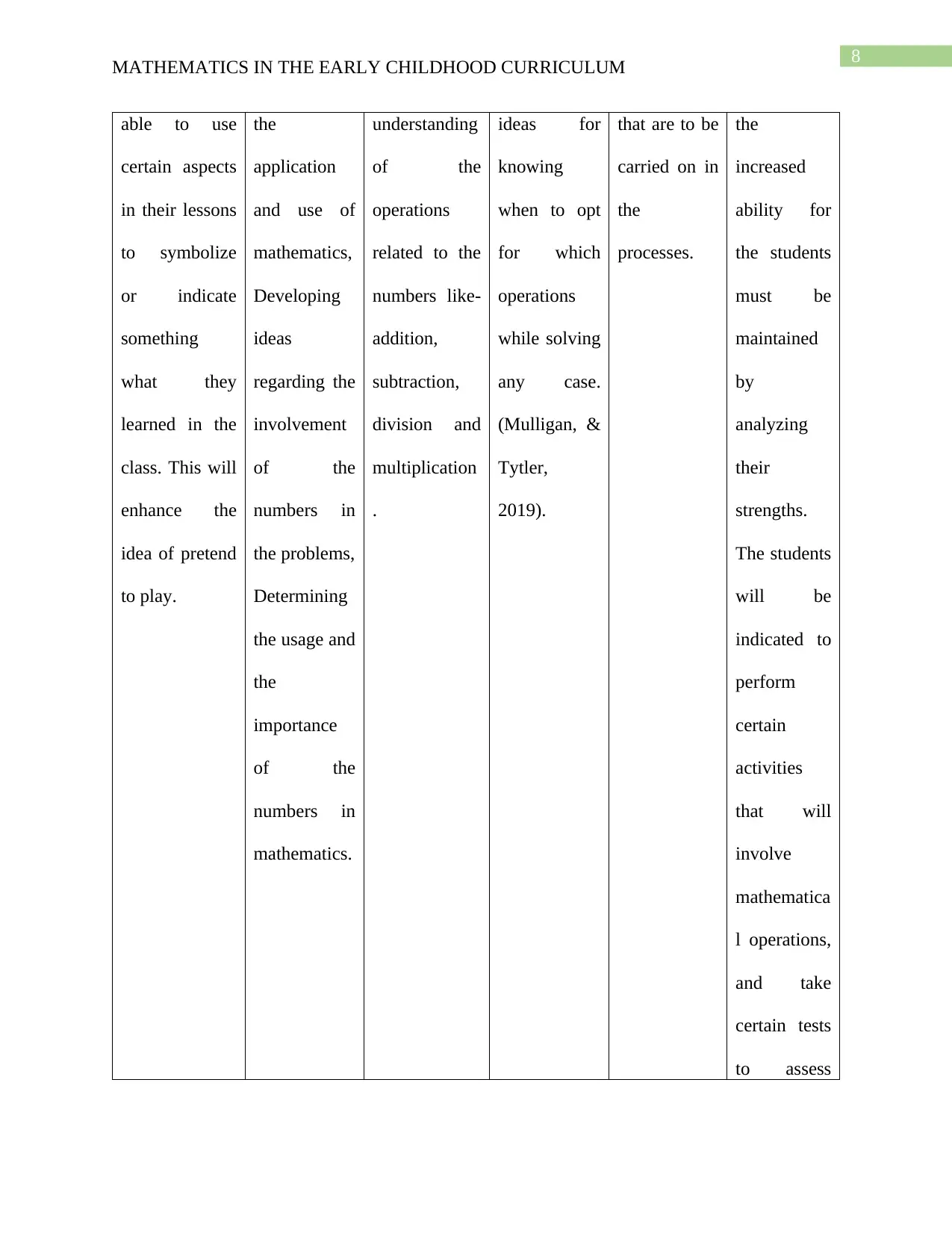
8
MATHEMATICS IN THE EARLY CHILDHOOD CURRICULUM
able to use
certain aspects
in their lessons
to symbolize
or indicate
something
what they
learned in the
class. This will
enhance the
idea of pretend
to play.
the
application
and use of
mathematics,
Developing
ideas
regarding the
involvement
of the
numbers in
the problems,
Determining
the usage and
the
importance
of the
numbers in
mathematics.
understanding
of the
operations
related to the
numbers like-
addition,
subtraction,
division and
multiplication
.
ideas for
knowing
when to opt
for which
operations
while solving
any case.
(Mulligan, &
Tytler,
2019).
that are to be
carried on in
the
processes.
the
increased
ability for
the students
must be
maintained
by
analyzing
their
strengths.
The students
will be
indicated to
perform
certain
activities
that will
involve
mathematica
l operations,
and take
certain tests
to assess
MATHEMATICS IN THE EARLY CHILDHOOD CURRICULUM
able to use
certain aspects
in their lessons
to symbolize
or indicate
something
what they
learned in the
class. This will
enhance the
idea of pretend
to play.
the
application
and use of
mathematics,
Developing
ideas
regarding the
involvement
of the
numbers in
the problems,
Determining
the usage and
the
importance
of the
numbers in
mathematics.
understanding
of the
operations
related to the
numbers like-
addition,
subtraction,
division and
multiplication
.
ideas for
knowing
when to opt
for which
operations
while solving
any case.
(Mulligan, &
Tytler,
2019).
that are to be
carried on in
the
processes.
the
increased
ability for
the students
must be
maintained
by
analyzing
their
strengths.
The students
will be
indicated to
perform
certain
activities
that will
involve
mathematica
l operations,
and take
certain tests
to assess
⊘ This is a preview!⊘
Do you want full access?
Subscribe today to unlock all pages.

Trusted by 1+ million students worldwide
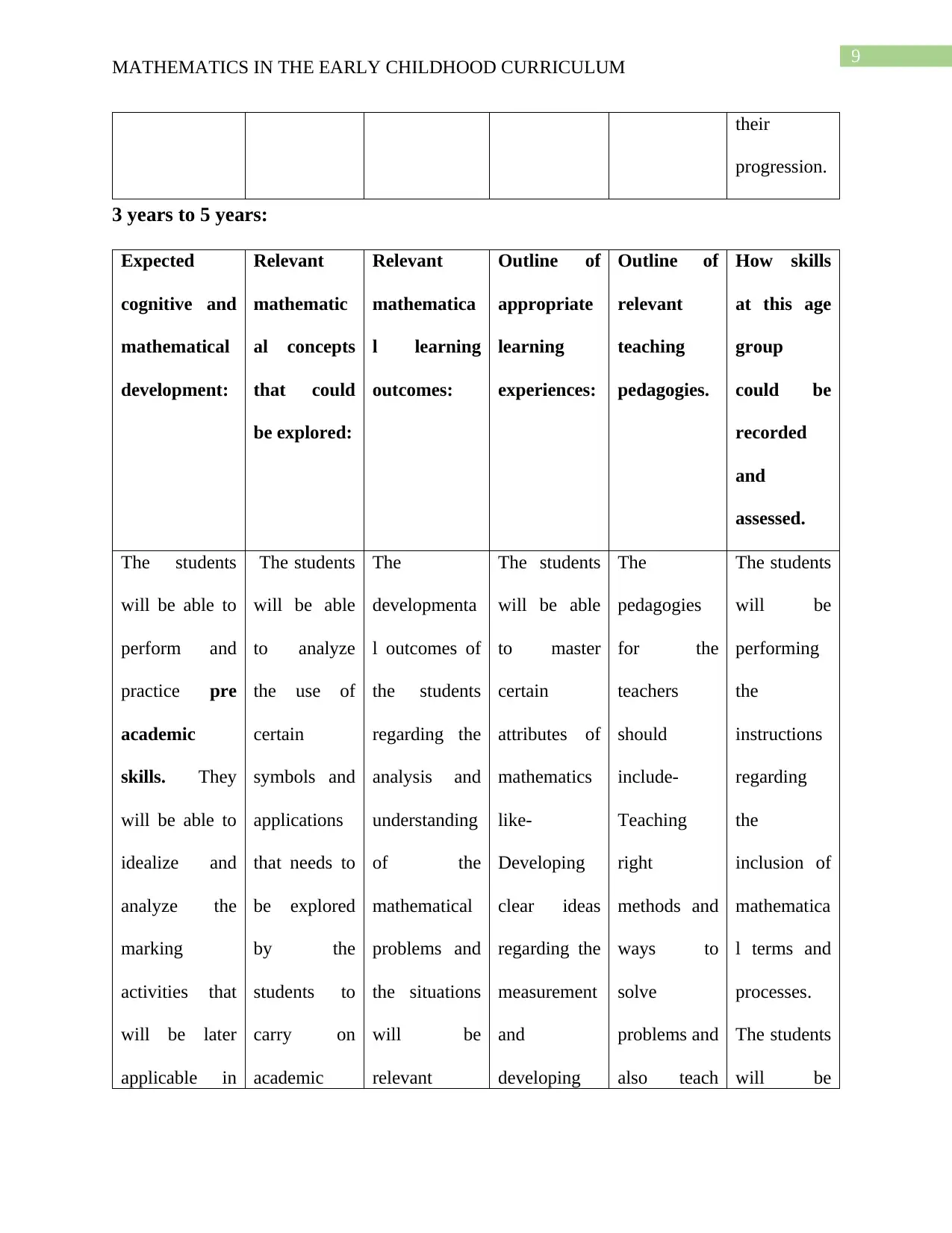
9
MATHEMATICS IN THE EARLY CHILDHOOD CURRICULUM
their
progression.
3 years to 5 years:
Expected
cognitive and
mathematical
development:
Relevant
mathematic
al concepts
that could
be explored:
Relevant
mathematica
l learning
outcomes:
Outline of
appropriate
learning
experiences:
Outline of
relevant
teaching
pedagogies.
How skills
at this age
group
could be
recorded
and
assessed.
The students
will be able to
perform and
practice pre
academic
skills. They
will be able to
idealize and
analyze the
marking
activities that
will be later
applicable in
The students
will be able
to analyze
the use of
certain
symbols and
applications
that needs to
be explored
by the
students to
carry on
academic
The
developmenta
l outcomes of
the students
regarding the
analysis and
understanding
of the
mathematical
problems and
the situations
will be
relevant
The students
will be able
to master
certain
attributes of
mathematics
like-
Developing
clear ideas
regarding the
measurement
and
developing
The
pedagogies
for the
teachers
should
include-
Teaching
right
methods and
ways to
solve
problems and
also teach
The students
will be
performing
the
instructions
regarding
the
inclusion of
mathematica
l terms and
processes.
The students
will be
MATHEMATICS IN THE EARLY CHILDHOOD CURRICULUM
their
progression.
3 years to 5 years:
Expected
cognitive and
mathematical
development:
Relevant
mathematic
al concepts
that could
be explored:
Relevant
mathematica
l learning
outcomes:
Outline of
appropriate
learning
experiences:
Outline of
relevant
teaching
pedagogies.
How skills
at this age
group
could be
recorded
and
assessed.
The students
will be able to
perform and
practice pre
academic
skills. They
will be able to
idealize and
analyze the
marking
activities that
will be later
applicable in
The students
will be able
to analyze
the use of
certain
symbols and
applications
that needs to
be explored
by the
students to
carry on
academic
The
developmenta
l outcomes of
the students
regarding the
analysis and
understanding
of the
mathematical
problems and
the situations
will be
relevant
The students
will be able
to master
certain
attributes of
mathematics
like-
Developing
clear ideas
regarding the
measurement
and
developing
The
pedagogies
for the
teachers
should
include-
Teaching
right
methods and
ways to
solve
problems and
also teach
The students
will be
performing
the
instructions
regarding
the
inclusion of
mathematica
l terms and
processes.
The students
will be
Paraphrase This Document
Need a fresh take? Get an instant paraphrase of this document with our AI Paraphraser
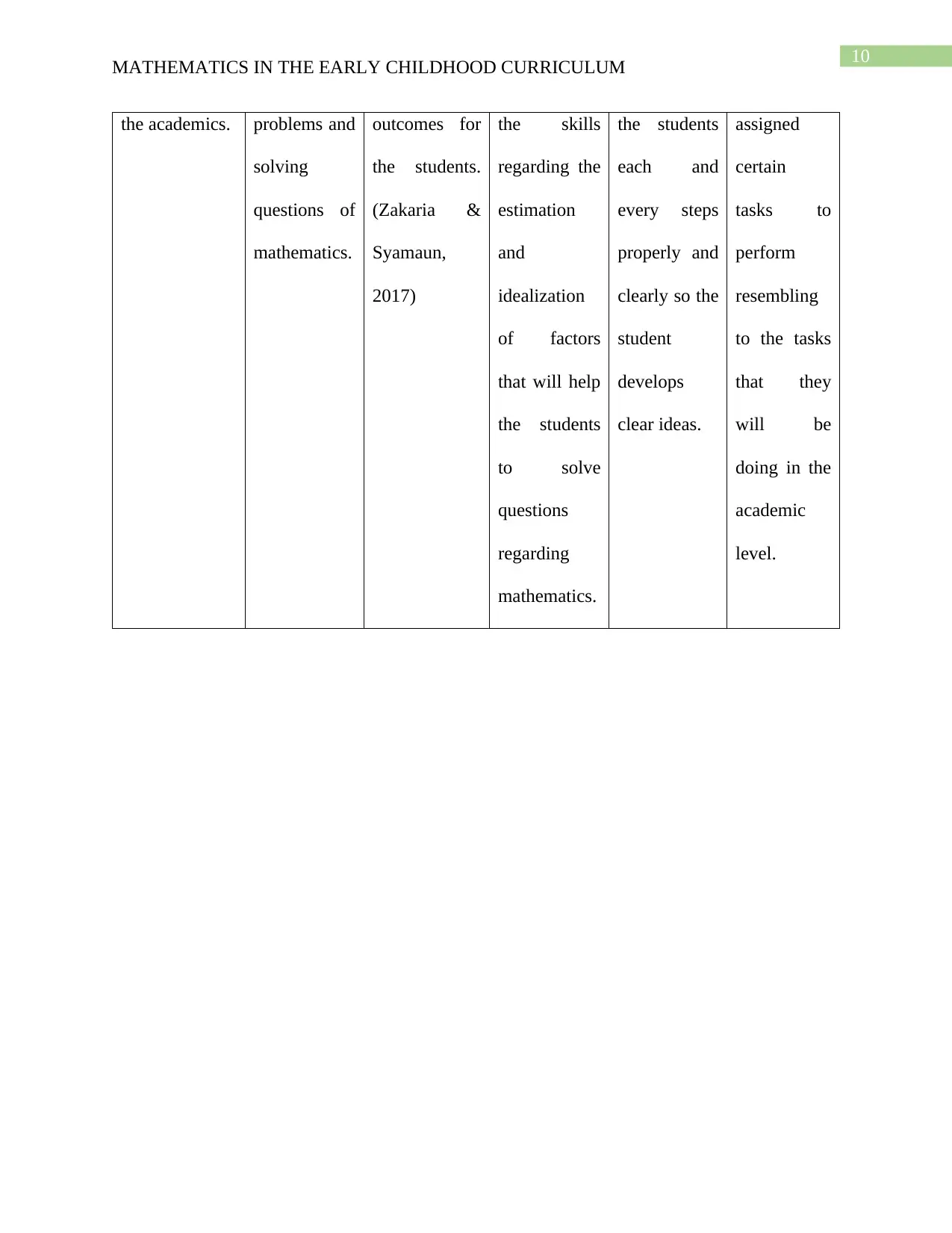
10
MATHEMATICS IN THE EARLY CHILDHOOD CURRICULUM
the academics. problems and
solving
questions of
mathematics.
outcomes for
the students.
(Zakaria &
Syamaun,
2017)
the skills
regarding the
estimation
and
idealization
of factors
that will help
the students
to solve
questions
regarding
mathematics.
the students
each and
every steps
properly and
clearly so the
student
develops
clear ideas.
assigned
certain
tasks to
perform
resembling
to the tasks
that they
will be
doing in the
academic
level.
MATHEMATICS IN THE EARLY CHILDHOOD CURRICULUM
the academics. problems and
solving
questions of
mathematics.
outcomes for
the students.
(Zakaria &
Syamaun,
2017)
the skills
regarding the
estimation
and
idealization
of factors
that will help
the students
to solve
questions
regarding
mathematics.
the students
each and
every steps
properly and
clearly so the
student
develops
clear ideas.
assigned
certain
tasks to
perform
resembling
to the tasks
that they
will be
doing in the
academic
level.
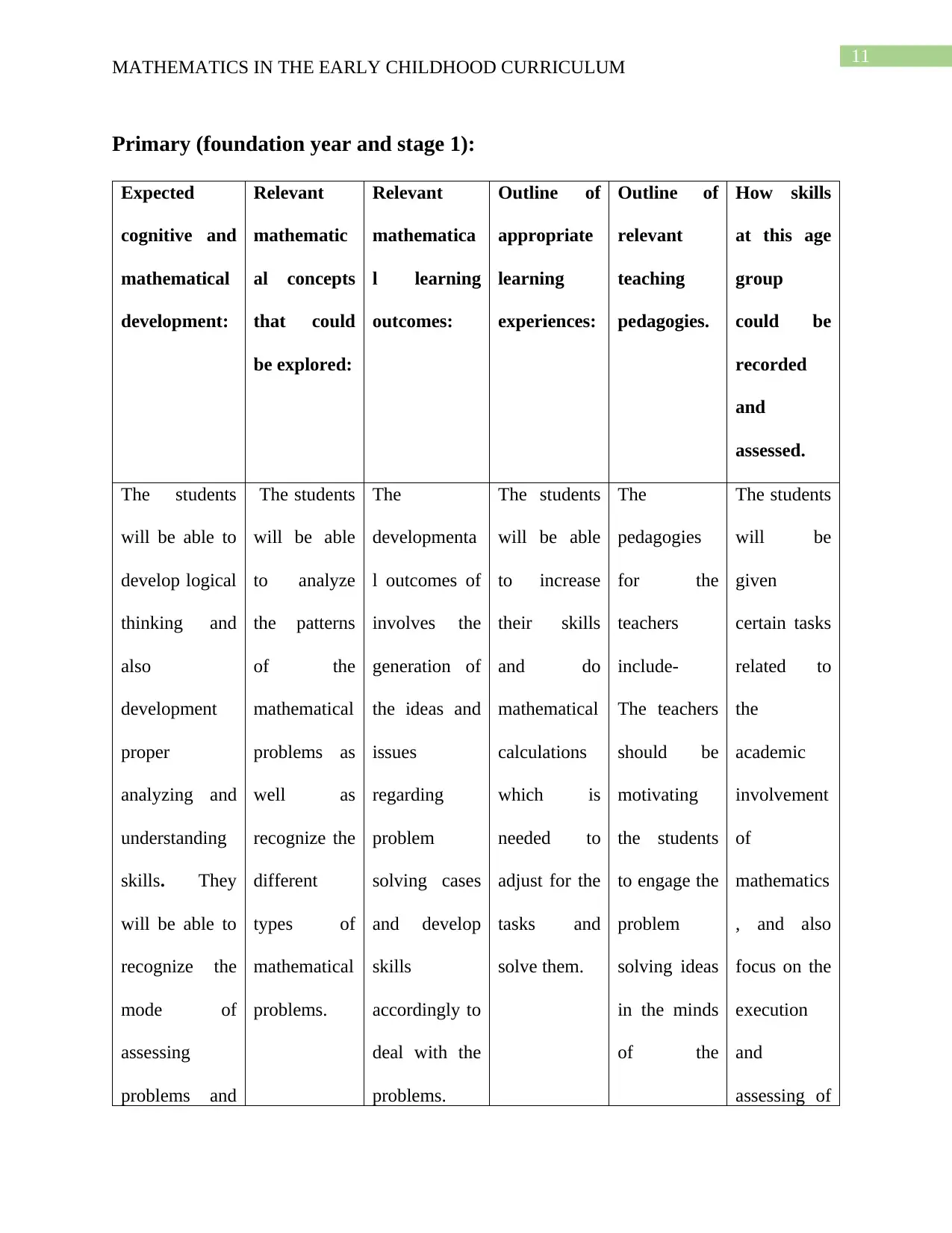
11
MATHEMATICS IN THE EARLY CHILDHOOD CURRICULUM
Primary (foundation year and stage 1):
Expected
cognitive and
mathematical
development:
Relevant
mathematic
al concepts
that could
be explored:
Relevant
mathematica
l learning
outcomes:
Outline of
appropriate
learning
experiences:
Outline of
relevant
teaching
pedagogies.
How skills
at this age
group
could be
recorded
and
assessed.
The students
will be able to
develop logical
thinking and
also
development
proper
analyzing and
understanding
skills. They
will be able to
recognize the
mode of
assessing
problems and
The students
will be able
to analyze
the patterns
of the
mathematical
problems as
well as
recognize the
different
types of
mathematical
problems.
The
developmenta
l outcomes of
involves the
generation of
the ideas and
issues
regarding
problem
solving cases
and develop
skills
accordingly to
deal with the
problems.
The students
will be able
to increase
their skills
and do
mathematical
calculations
which is
needed to
adjust for the
tasks and
solve them.
The
pedagogies
for the
teachers
include-
The teachers
should be
motivating
the students
to engage the
problem
solving ideas
in the minds
of the
The students
will be
given
certain tasks
related to
the
academic
involvement
of
mathematics
, and also
focus on the
execution
and
assessing of
MATHEMATICS IN THE EARLY CHILDHOOD CURRICULUM
Primary (foundation year and stage 1):
Expected
cognitive and
mathematical
development:
Relevant
mathematic
al concepts
that could
be explored:
Relevant
mathematica
l learning
outcomes:
Outline of
appropriate
learning
experiences:
Outline of
relevant
teaching
pedagogies.
How skills
at this age
group
could be
recorded
and
assessed.
The students
will be able to
develop logical
thinking and
also
development
proper
analyzing and
understanding
skills. They
will be able to
recognize the
mode of
assessing
problems and
The students
will be able
to analyze
the patterns
of the
mathematical
problems as
well as
recognize the
different
types of
mathematical
problems.
The
developmenta
l outcomes of
involves the
generation of
the ideas and
issues
regarding
problem
solving cases
and develop
skills
accordingly to
deal with the
problems.
The students
will be able
to increase
their skills
and do
mathematical
calculations
which is
needed to
adjust for the
tasks and
solve them.
The
pedagogies
for the
teachers
include-
The teachers
should be
motivating
the students
to engage the
problem
solving ideas
in the minds
of the
The students
will be
given
certain tasks
related to
the
academic
involvement
of
mathematics
, and also
focus on the
execution
and
assessing of
⊘ This is a preview!⊘
Do you want full access?
Subscribe today to unlock all pages.

Trusted by 1+ million students worldwide
1 out of 15
Related Documents
Your All-in-One AI-Powered Toolkit for Academic Success.
+13062052269
info@desklib.com
Available 24*7 on WhatsApp / Email
![[object Object]](/_next/static/media/star-bottom.7253800d.svg)
Unlock your academic potential
Copyright © 2020–2026 A2Z Services. All Rights Reserved. Developed and managed by ZUCOL.





